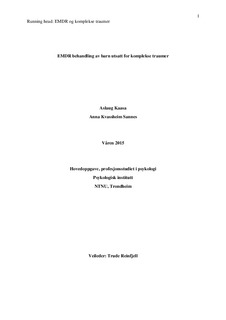| dc.description.abstract | The purpose of this thesis was to explore whether Eye Movement Desensitication Reprocessing (EMDR) is a suitable method for the complex symptoms associated with children exposed to trauma repeatedly and persistently. Theory on complex trauma is presented, thoughroughly going through seven domains of symptoms associated with children exposed to complex trauma. EMDRs underlying theory is presented. Additionally, the methodological steps are reviewed. The thesis includes a presentation of available research on EMDR and children with complex reactions to trauma. EMDRs capability to address and treat the complex reactions/symptoms to trauma is discussed on a theoretical and empirical level. Theoretically it can be concluded that EMDR to a certain point is a suitable method for treating these children, if certain necessary adjustments and additions are included in the treatment. Empirically it is hard to come to any conclusions. To this date no studies spesifically addressing EMDRs effect on complex trauma reactions exist. To be able to come to an empirical conclusion, research will have to target EMDRs suitability for the symptoms and needs of children exposed to complex trauma. Adaptations thought to be necessary to conduct such studies are discussed. | nb_NO |
